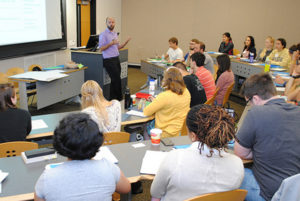How engaging in educational research influenced my teaching
by Ryan Bowen, CFT Graduate Assistant

When it came to teaching, I used to have intuitive sense about what effective instruction looked like in the classroom. I could walk into a room, deliver a lesson, facilitate an activity, and assess learning in some capacity. If my students met a certain performance standard or quantitative score on a particular piece of content, I would justify my lesson, activity, and assessment as being “effective.” However, what truly constitutes “effective” teaching? In accordance with that, what is learning, and what does it look like for my students?
These questions, intertwined with my lingering suspicion that the scores for each of my students in the grade book was not the most accurate summary of their learning, influenced my decision to study how people think and learn, as well as what thinking and processing strategies they can employ.
I became involved with the BOLD Program at the CFT, and for my project, I settled on the research question of: could the incorporation of student design into an upper-level college chemistry course promote metacognition (defined as thinking about one’s own thinking) and argumentation? We developed various materials for one particular experiment in the lab curriculum, posted them online, and encouraged students to design their own experiment using what resources we offered them. We attempted to answer our research question by using laboratory observations (with a trained observer), semi-structured interviews (after the lab was completed), and argumentation analysis. All of these methods of analysis were done for a control lab where students did not design any part of the experiment, and the results were compared.
If you have any interest in reading more about our findings, we did publish it as an activity in the Journal of Chemical Education, of which a reference can be found at the bottom of this blog post. However, long story short, we found that yes, student design did seemingly promote metacognition and less superficial argument construction in our specific case. Due to the nature of our study design, we were unable to make generalizations, but we believe it still offered insight into the link between metacognition and pedagogical approaches such as student autonomous design and development of arguments around lab data.
The experience of engaging in teaching and educational research and writing my paper have been incredibly influential on my professional development as a scholar and a teacher. If a student hits that target criterion or achieves that one numerical score, I’ve found that single metric alone is not always enough to justify learning in every case. The literature has shown that students engage in a variety of mental processing strategies, and instructor awareness of those strategies, how to promote and develop them, and how to identify when students are engaging in higher-order thinking are keys to meaningful learning.
The research also suggests that promoting metacognitive thinking in students has the potential to narrow the aptitude gap, ultimately providing all students with a platform to achieve the level of success they desire in our courses. I shared my journey and say all of this to say that engaging with the scholarship of teaching and learning and participating in the discourse on improvement of teaching has encouraged me to change how I approach my teaching and the opportunities I provide for learning.
In my case, I went from a suspicion that learning was more complicated than the grades I was assigning and the assessments I was using, to a desire to understand the intricate processes associated with metacognition and, now, epistemic cognition (how people know what they know, what they don’t know, and what they believe).
I would encourage everyone to explore teaching research in their disciplines, at the very least to appreciate the work other scholars are doing to improve education and to parse the complex intellectual development of ourselves and the learners that occupy the seats in our classrooms. However, there’s also the chance you stumble upon something that piques your interest and influences your teaching in meaningful ways.
Article reference: Bowen, R. S., Picard, D. R., Verberne-Sutton, S., and Brame, C. J. (2017). Incorporating Student Design in an HPLC Lab Activity Promotes Student Metacognition and Argumentation. Journal of Chemical Education, 95 (1), 108-115.

Leave a Response